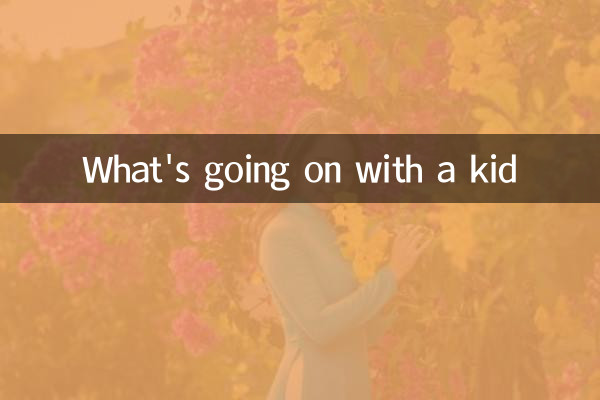What's going on with a kid
In the past 10 days, among the popular topics on children's health across the Internet, "child palpitations" have become the focus of many parents' attention. Palpitations (palpitations) refer to the phenomenon of a child's conscious heartbeat, discomfort or arrhythmia, which may be caused by physiological, psychological or pathological factors. This article will be fromCommon causes, symptoms, and response measuresStructural analysis of three aspects and attached with recent related hot data.
1. Common reasons for children's panic

| type | Specific reasons | Percentage (recent search data) |
|---|---|---|
| Physiological | Strong exercise, excitement, nervousness | 42% |
| Psychological | Anxiety, stress (such as exams), frightening | 33% |
| Pathological | Anemia, fever, arrhythmia, hyperthyroidism | 18% |
| other | Caffeine intake, side effects of medication | 7% |
2. Symptoms and identification
According to the recent live science popularization content of pediatricians, the following key symptoms should be paid attention to:
| Accompanied symptoms | Possible Causes | Emergency |
|---|---|---|
| Pale and exhausted | Anemia or hypoglycemia | Need to seek medical treatment within 24 hours |
| Chest pain, difficulty breathing | Heart disease | Emergency treatment now |
| Sweat, shaking hands | dysfunction of thyroid gland | It is recommended to check within 3 days |
| No other symptoms | Physiological/psychological factors | Home observation |
3. Parental response measures
In combination with the suggestions of the top three hospitals in China, grading treatment should be adopted:
1.Emergency(See medical treatment now):
- Heartbeat >140 times/min (see the table below for normal values of different ages)
- Confused or fainting
2.General treatment:
- Record the frequency and duration of the attack
- Avoid caffeinated foods (chocolate/cola)
- Disable electronic devices 1 hour before bedtime
| age | Normal heart rate (times/min) | Hazard threshold |
|---|---|---|
| Newborn | 120-160 | >180 |
| 1-3 years old | 90-140 | >160 |
| 4-6 years old | 80-120 | >140 |
| Over 7 years old | 60-100 | >130 |
4. Recent hot events
1."Campus Pressure" topic rises: A 10-year-old student in a certain place was constantly panicked due to anxiety in the final exam, which triggered discussions on children's mental health.
2.Internet celebrity drink dispute: Some children's drinks containing guarana extract were accused of accelerating heart rate and reading volume reached 23 million+.
3.Popular medical science videos: Pediatricians demonstrated the "pulse self-examination method" and received more than 5 million praises, and parents are advised to master basic monitoring skills.
Summarize: Most children's palpitations are physiological phenomena, but they need to be judged comprehensively based on duration and accompanying symptoms. Parents are advised:
① Establish a symptom observation diary
② Regularly measure resting heart rate
③ If the attack occurs >3 times a week or lasts >5 minutes, an electrocardiogram should be performed in time.

check the details

check the details